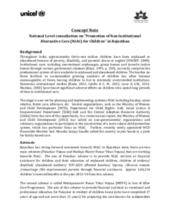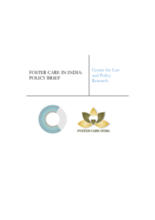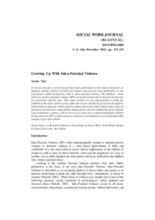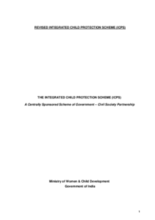childrens_living_arrangement
children_living_without_bio
Displaying 381 - 390 of 427
In a statement filed by the Deputy Superintendent of Police, children have been brought into Kerala, the state in India, in order to supplement a shortage of orphans and “destitute children” at the orphanage at Mukkam at Kozhikode.
Foster Care India invites child protection experts and scholars to submit papers for a two-day “National Level Consultation on Promoting Non Institutional Alternative Care" in Rajasthan with the support of UNICEF. The event will be held in Jaipur, Rajasthan on 16 & 17th July 2014.
The Human Dignity Foundation (HDF) invites organisations to respond to a Call for Proposals on child protection. The purpose of the call is to identify projects that will contribute to ensuring that ‘all children are safer at home and in the community’.
This documentary published by Journeyman Pictures investigates the reality behind India's commercial baby surrogate industry.
This article uses data collected from adoptive parents’ postadoption and governmental data in Romania, Ukraine, India, Guatemala, and Ethiopia to focus on domestic adoption in each of these countries. The article highlights both promising practices in domestic adoption as well as policies and practices that require additional research.
The Human Dignity Foundation (HDF) invites organisations to respond to a Call for Proposals on child protection. The purpose of the call is to identify projects that will contribute to ensuring that ‘all children are safer at home and in the community’.
This policy brief reviews the legal framework for foster care in India, including an analysis of the current provisions of foster care along with the rules and schemes on foster care framed by states in India, with a focus on Delhi and Goa.
In the last decade, a lot of research has been undertaken on the issue of domestic or intimate partner violence in India but limited research has been undertaken on the issue from a child’s perspective, that is, intra-parental violence. The children – silent witnesses of intra-parental violence (IPV) are neglected not only by the parents but also by researchers and the state. Thus, there remain very few opportunities to bring the children to the notice of the society. Often the society and the legal systems designed to help victims of domestic violence fail to address the needs of the children due to lack of sensitivity towards their vulnerability. Ample laws do exist in India that deal with the issue of domestic violence, still there is a long way to go to understand the plight of children being exposed to IPV as silent witnesses and give it recognition as a social problem that requires legal intervention.
This issue brief from the UNHCR highlights key messages from UNHCR in regards to alternative care, including the importance of making alternative care arrangements based on the best interests of the child and using residential or institutional care only as a very last resort.
The Integrated Child Protection Scheme (ICPS) of India outlines, and contributes to the implementation of, the Government’s responsibility to establish an effective and efficient child protection system.





